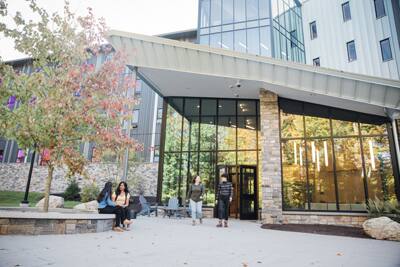Bachelor of Science in Information Technologies New England campus experience

Program Overview Why get an information technologies degree on campus?
In the Bachelor of Science (BS) in Information Technologies program at Southern New Hampshire University, you'll combine technical abilities with business skills, so you can identify and analyze organizational needs.
You'll be a part of our growing community in the School of Engineering, Technology and Aeronautics (SETA), as well as part of teams that are designing, implementing and evaluating computing-based solutions for real-world scenarios. Because when you're able to solve today's business problems, you can create tomorrow's most effective IT systems.
Skills you'll learn:
- Analyze and solve complex computing problems
- Design, implement and evaluate computing-based solutions
- Communicate effectively in various professional contexts
- Function effectively as a member or leader of a team
- Secure company infrastructure
- Create and maintain websites

Courses & Curriculum Build systems for business solutions with on-campus information technologies courses
Here, you'll combine technical abilities, business acumen, people skills and a problem-solving mindset to help organizations leverage new technologies. In your classes, you'll learn the fundamental information technologies, systems, data management methods and computational thinking strategies necessary to support organizational decision-making. You'll also learn how to recommend effective system design and maintenance solutions, showing your value no matter what organization you serve.
Interested in learning in an online environment? This same curriculum is offered through SNHU's online information technologies degree.
Learn from instructors with industry experience
Our faculty bring with them decades of knowledge and experience in information technologies, which informs the development of SNHU's courses and curriculum. They look forward to supporting your journey both in the classroom and as you work toward a career in your field.
Barbara Bancroft
Position
Associate Professor
Joined SNHU
2020
Education
- PhD from Case Western Reserver University
- MBA from Western Governors University
- BS from Edinboro University of Pennsylvania
Dr. Barbara Bancroft previously served as a professor of computer science at Nashua Community College where she developed a cybersecurity degree. She also taught at the University of Massachusetts Lowell and New England College. She developed software for mobile devices at Puma Technology and worked on the space program at Mission Research Corp. Bancroft is a senior member of the Institute of Electrical and Electronics Engineers, and she has held such positions as New Hampshire chair of IEEE Computer Society and New Hampshire chair of Women in Engineering. UML recognized her with an award for best practices in online education.
Bo Kim
Position
Professor, Department Chair (Computer Science), Coordinator (Information Technology)
Joined SNHU
2017
Education
- PhD in Computer Science from the University of Massachusetts
- MS in Computer Science from the University of Massachusetts
- BS in Computer Science and Statistics from Chungnam National University
Former dean of the School of Engineering and Computer Science at Daniel Webster College, Dr. Bo Kim possesses a wealth of experience in the computer science field. Kim has over two decades of industrial experience, as systems architect at Lucent Technologies, and teaching experience, including time at Merrimack College and the University of Massachusetts. Kim is a member of the Association of Computing Machinery and the American Society for Engineering Education.
To learn more about SNHU faculty, visit our campus faculty page.
Campus major courses
You’ll take major courses that provide you with a solid foundation in your area of study – in some cases featuring experiential or project-based learning opportunities, labs, simulations and internships. These courses will allow you to learn a wide variety of topics and help prepare you for a role in your desired field.
Courses may include:
Visit the course catalog to view the full BS in Information Technologies curriculum.
Campus general education courses
All undergraduate students are required to take general education courses, which are part of SNHU's newly redesigned program, The Commons. The goal of The Commons' curriculum is to empower you with some of the most in-demand skills, so you can succeed not only in your academic career, but in your personal and professional life too.
Courses may include:
Can’t wait? You don’t have to!
Apply now if you’re ready, and have your decision within 30 days. Or, schedule a visit and come see us in person!
Career Outlook What can I do with an information technologies degree?
The need for skilled information technology professionals continues to grow, and earning your BS in Information Technologies provides you with the skills needed to build systems, write software and utilize web-based technologies to support business needs. This means that there is a need for information technologies graduates at varying levels in nearly all industries. Some of the fields our students have pursued after graduation include finance, healthcare and education.
Career paths include:
- IT support specialist
- Front-end web developer
- Network support specialist
- Full stack web developer
- Systems administrator
Openings projected each year for computer and information technology occupations through 2033, according to the U.S. Bureau of Labor Statistics (BLS).1
Median annual salary for computer and information technology occupations in May 2023, according to the BLS.1
Understanding the numbers
When reviewing job growth and salary information, it’s important to remember that actual numbers can vary due to many different factors—like years of experience in the role, industry of employment, geographic location, worker skill and economic conditions. Cited projections do not guarantee actual salary or job growth.

Campus Student Experience So, what's it like taking classes on campus?
At Southern New Hampshire University, we believe in learning by doing. So, starting in your first year, the courses you'll take in this program are project-based and interactive. You'll use real-world tools and systems, including AWS, Python and Cisco Packet Tracer, to complete your tasks in class. You'll also have the opportunity to be part of interdisciplinary teams, even having the chance to lead one of your own. Plus, you could earn credentials along the way, such as AWS Cloud Foundations, Certified Pega System Architect, A+ and Security+.

Student support
At SNHU, you don’t have to do this college thing alone. You’ll have help from your advisor, access to tutoring and office hours, career coaching, and mental health services so you can do your best and feel your best.
Additionally, our Office of Diversity and Campus Accessibility Center make campus a safe place for everyone. Visit our Student Services page to learn more about our support offerings.

Small class sizes
With an average class size of 15-25 (depending on your major) you’ll learn in an environment where professors with real world experience know you by name.
Here, you’re not getting lost in giant lecture halls, but instead, actively participating in thoughtful dialogue where you’re always encouraged to collaborate with your peers and ask questions when they arise.

State-of-the-art facilities
Our 300-acre campus has everything you need. From technology-advanced classroom settings to your dorms complete with fitness centers and hangout spots, our goal is to give you the best college experience possible.
Whether you’re learning in a classroom, in a lab, on the field, or in your field, you’ll have what you need to be successful from the moment you wake up to the moment you close your textbooks.
School of Engineering, Technology and Aeronautics Learn about the School of Engineering, Technology and Aeronautics
In the School of Engineering Technology and Aeronautics, you'll put theory into practice daily. From circuit projects to flight test classes, you'll collaborate with peers, faculty and the community to take on real-world challenges. With a drone-flying arena, unmanned aerial vehicle prep space, wood shop, robotics lab and more, you'll have all the tools at hand to bring your ideas off the page.
3D printing lab
Drone arena
Robotics lab
How SNHU makes college affordable
At Southern New Hampshire University, we're on a mission to make high-quality education more accessible with more affordable tuition. With 70+ career-focused majors, state-of-the-art facilities, D2 sports and over 70 student clubs and organizations, you can get the campus experience you've always dreamed of at a more affordable price.
Fill out the FAFSA to see if you’re eligible for grants or work-study. (You could also be offered loans, though you’ll have to pay those back later.)
Transfer up to 90 credits toward your bachelor's degree program at SNHU. If you’ve taken one course or many, we’ll evaluate them for you.
Getting free money for college – from SNHU or an outside organization – could help you save hundreds or even thousands of dollars.
Hear from us

Bo Kim, Professor, Department Chair (Computer Science), Coordinator (Information Technology)
Accreditations
SNHU is accredited by the regional accreditor the New England Commission of Higher Education (NECHE). The university also carries specialized accreditations for some programs.

Sources & Citations
1Bureau of Labor Statistics, U.S. Department of Labor, Occupational Outlook Handbook, on the internet, at https://www.bls.gov/ooh/computer-and-information-technology/home.htm (viewed Oct. 8, 2024). Cited projections may not reflect local or short-term economic or job conditions and do not guarantee actual job growth.
Your dream school is waiting
Apply now or schedule a visit today.


